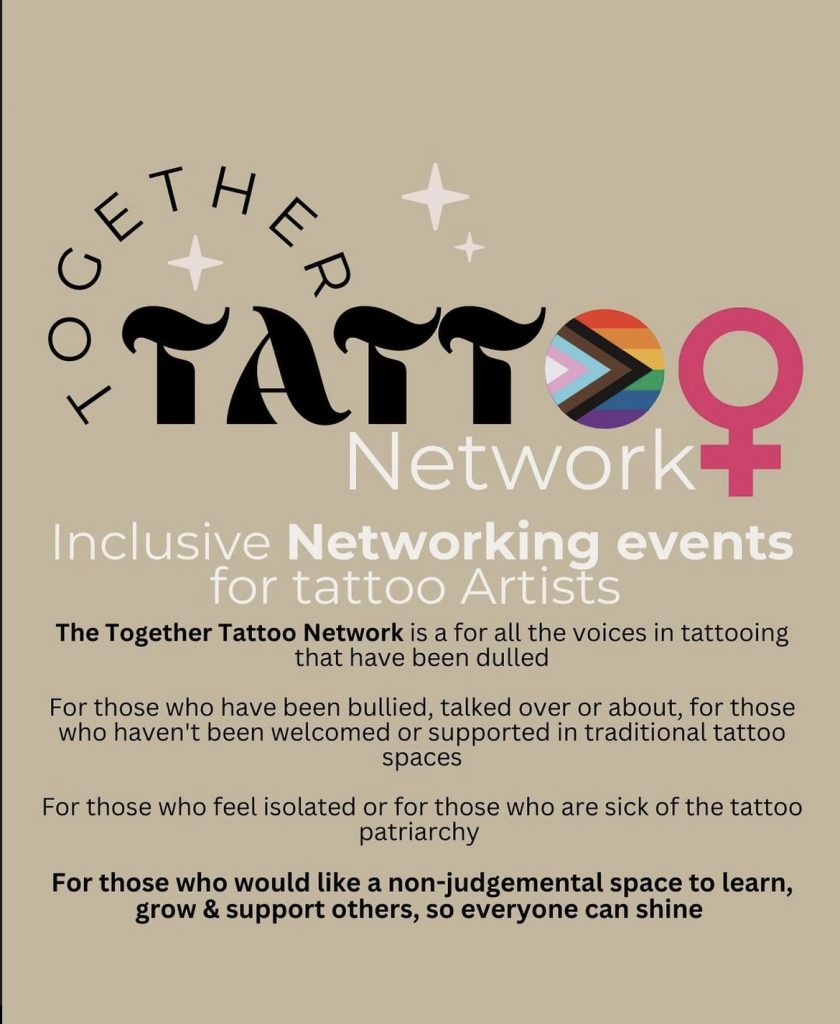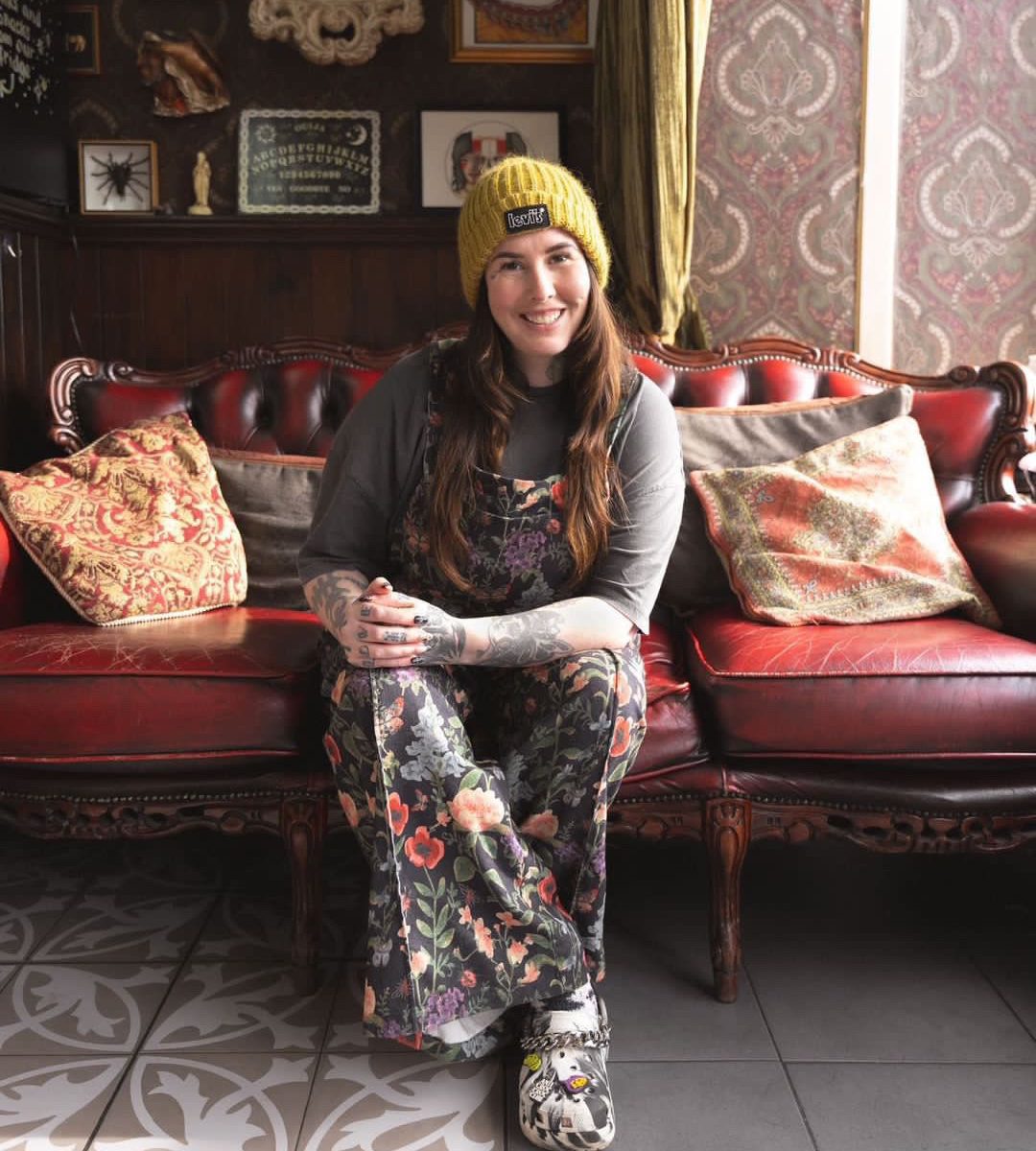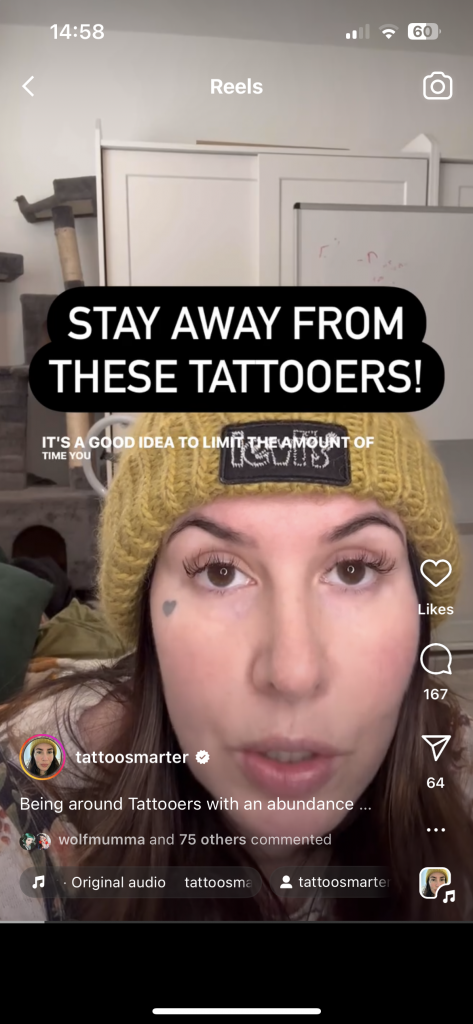Social media has undoubtedly influenced the tattoo industry, bringing both advantages and drawbacks. A lot of people have found their favourite tattoo artists and styles through online platforms, and smaller tattoo artists are gaining much-deserved recognition through their social media presence. The benefits are huge, making the tattooing world more accessible than ever before. But, what are the downsides? Is social media shaping or breaking the tattoo industry?
We sat down to have a chat about it with Kezz Richardson, tattoo artist, studio owner and mentor who helps tattoo artists increase their bookings and avoid burnout. With over 20 years of experience, Kezz has seen the influence of social media on the tattoo industry. Inspired by this, she founded ‘Tattoo Smarter‘ and recently launched a new course designed to help tattoo artists master their social media presence and discover personalised strategies that work for them. So, if anyone understands the ins and outs of social media and tattooing, it’s definitely Kezz.
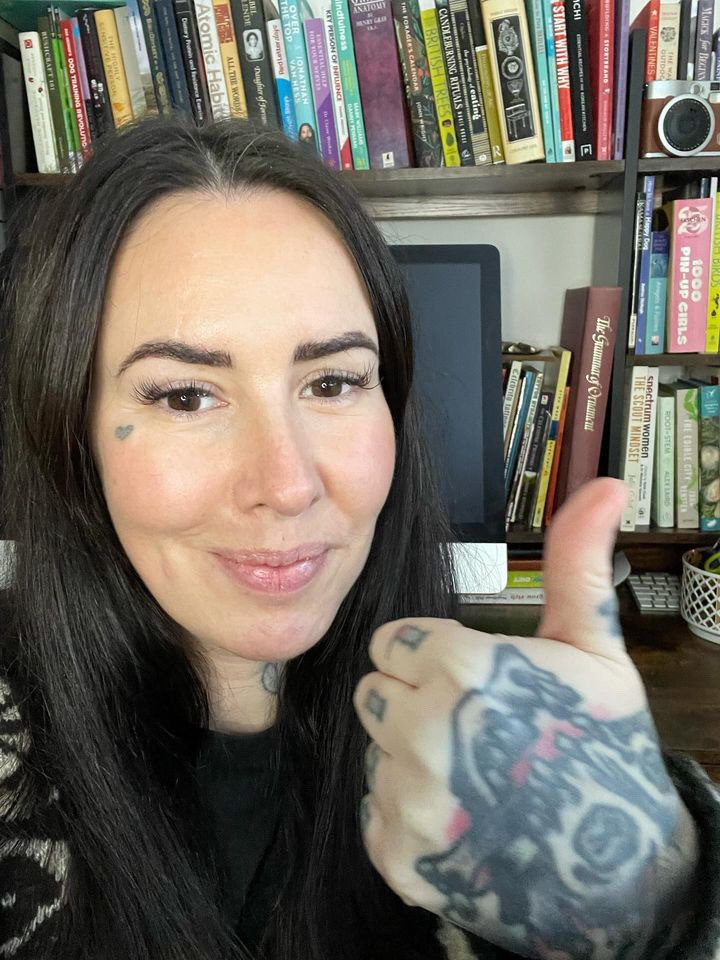
First off, do you think social media has helped or made it more challenging for tattoo artists?
This is such a nuanced question, it’s made some parts harder and others easier. Social media is so dynamic, it’s changing all the time.
I’ll start with the positives: social media has helped so many tattoo artists connect with clients on a much wider scale than before, all with the click of some buttons. Pre-social media, you might have had 50 people walk into your shop every week – then suddenly you can put your work in front of thousands of potential clients just by using your phone.
Another positive is that social media has helped tattoo artists see and be inspired by other artists’ work more easily. We used to rely on magazines and conventions, which have historically been curated and shaped mostly by white cis men (whose platforms were often influenced by industry politics).
Social media has enabled more minority voices to find their place in tattooing and has given a platform to many types of artists for the first time.
Social media has connected artists on a mass scale, and sharing information digitally has pushed both technical tattoo and business standards much further than if we were still progressing at an analogue pace. The rate at which artists are improving is astonishing compared to even ten years ago.
It’s also provided a huge opportunity to create a more diverse network of artists that may never have met before- going for guest spots meeting up at conventions etc, community & support absolutely make tattooing easier.
Now the downsides: social media has changed at such a rapid pace that some artists that aren’t able (or don’t want) to keep up are feeling completely disenfranchised and lost. They have found themselves with less and less clients because the ability to be visible online is now much harder. I completely get why they feel like this. They wanted to tattoo; the job has lots more moving parts now.
The evolution of social media has especially affected the artists that embraced social media at the start when they found it was so easy to collect followers and followers equalled bookings. Now follower count is mostly irrelevant and lots of artists don’t understand engaged niche followers are much more important now.
Social media has evolved way quicker than our collective education about how to use it.
Those who have always had social media to market themselves are on the whole more adaptable but are still struggling with the changes. I was around well before it and it’s benefitted my career massively. We didn’t need social media before, but we have become to rely on it if we want to be competitive. It was a free tool at the start where the barrier to entry was low – the goalposts have now changed.
Lots of tattoo artists still say we don’t need online visibility and that it’s just word of mouth that’s important but I strongly disagree with this. The first thing clients do after getting a recommendation is to go look online at artists before they make a decision, they very rarely just decide to walk to the tattoo shop without some digital research.
Social media has undoubtedly contributed to more people wanting to become tattoo artists – this means greater competition than before, but this isn’t necessarily a bad thing. There are clients for everyone – different styles, different budgets, different experiences are now catered for. Unfortunately, lots of tattoo artists don’t like the idea of so many newer artists coming into the industry and doing things in a different way or them having to adapt to be competitive.
There are more clients than ever before, but some tattoo artists feel that these new clients aren’t ‘tattoo people’ and are too ‘mainstream.’ This has made gatekeeping more important for those trying to exclude others.
Social media has also allowed clients to think that we owe them our time.
People expect quick responses, and send impatient messages with the expectation of an instant reply, instead of allowing us to focus on the client in front of us or have actual rest days, only adding to our stress. I advocate for professional boundaries, such as forms and digital booking systems, to address this issue. However, tattoo artists as a whole have been slow to adopt these practices, despite my efforts over the past two years to promote them.
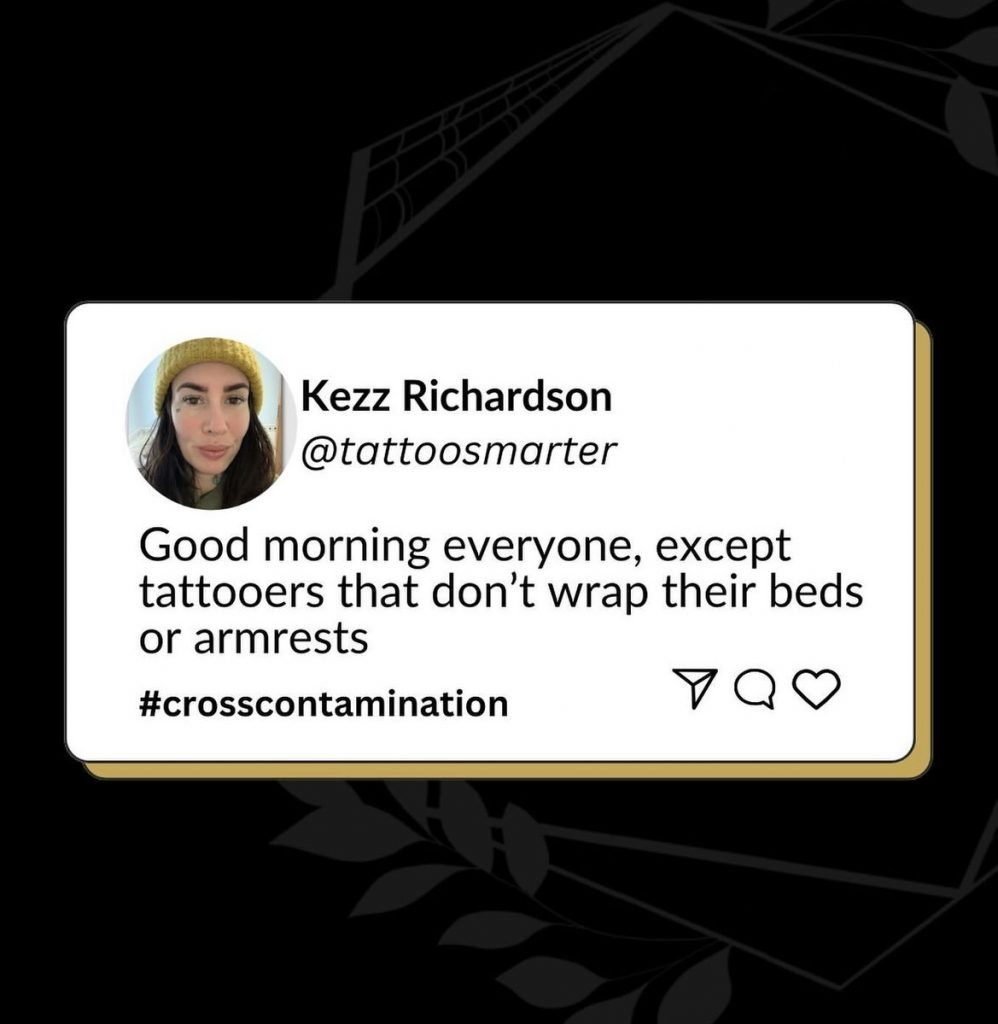
Lastly, I believe social media has contributed to a decline in tattooing hygiene – or at least an increase in the number of tattoo artists with appalling hygiene standards. When reels showcasing terrible hygiene practices are shared, it gives the impression that such behaviour is acceptable or normal, leading others to imitate these bad practices. For example, there was a case where a tattoo artist used an actual cat’s paw to apply the stencil onto a client’s skin, with the cat remaining on the client’s legs throughout the entire tattoo session. We’re witnessing more alarming instances where people prioritise views over their clients’ safety. Examples include matching BFF tattoos where open wounds are rubbed against each other, uncovered beds or armrests, artists wearing watches, and hair or sleeves dipping into open tattoos—the unfortunate list goes on.
Phew. So like I said, nuanced as fuck.
Does managing your social media as a tattoo artist feel like a second job?
Absolutely. Tattoo artists have like 25 jobs on top of tattooing and social media is now a huge part of staying visible. There are tons of other jobs we do like admin, customer service, we are our own HR department, accounting etc.
It takes up a lot of time and energy – especially when it’s an entirely different skillset to tattooing. It feels like an extra job because lots of tattoo artists just want to tattoo. When we only focus on the tattoo part though, we are forgetting that connecting with our clients is also a huge part of our job.
Clients aren’t just a canvas, we sometimes forget that when we focus solely on the tattoo aspect. Marketing is more sophisticated now yes, but it’s ALWAYS been a part of our job.
My advice for anyone struggling is to streamline all your off-skin work practices rigorously. For example, admin tasks can be vastly improved with a digital booking system, saving hours each week. You can then use this reclaimed time for marketing on social media, integrating it into your regular workload rather than piling it on top.
Also, educate yourself. Social media becomes more manageable when you understand what you’re doing; there’s no shame in seeking help or striving to improve. This is even more crucial if you work in a private studio where visibility is limited. If your studio has a small following, you’ll need to put in extra effort.
Be cautious with social media “assistants”; many may not be knowledgeable. If you decide to outsource, ensure they have demonstrated significant engagement. There are countless “experts” out there just looking to take your money.
Do you think social media brought more stress than good to tattoo artists?
This answer is artist-dependent. Some artists have thrived using social media, some have become completely disillusioned and some have thrived for a short period and then completely burnt out.
For some tattoo artists, social media increases anxiety about not posting enough or feeling behind compared to others who appear to have everything under control, even when they don’t. Much of this perception is an illusion. To reduce stress, the best approach is to learn how to use and manage your energy online and embrace therapy. Anything related to our income is always going to cause stress to some degree, learning about social media gives back a bit of that control.
Does having an active social media presence affect the number of bookings for an artist?
Absolutely not. You could post three times per day and it won’t get you more engagement from the right people or bookings for a number of reasons.
Understanding your client journey online is huge. I still see tattoo artists with no location in their bio or no directions to their link to book using an enquiry form etc. When you miss out on these simple things you are missing out on bookings because you’ve made it difficult for clients to book with you. Making the client journey as easy as possible gets you bookings.
Understanding your retention is massive too, you might get clients through your door using socials but if you don’t get repeat clientele then there’s something up with your client experience.
You can’t just rely on your socials. It’s one part of the puzzle.
If your content isn’t engaging it doesn’t matter how much you post. The goal for your socials is to know your audience and post quality content that will make people feel something. It also helps to be able to analyse the data around your metrics too. Tons of likes don’t mean anything – a good post with lots of inquiries does.
As I mentioned earlier your socials should be all about connection. Tattoo artists turn their noses up at the world ‘content’ but anything you post online is content, including tattoo photos. It’s just that the majority of clients don’t find tattoo photos engaging anymore. You need to find new ways of repackaging your work in a more palatable format to get you up the rankings, on to the explore page, and actually seen.
Tattoo Smarter With Kezz Richardson
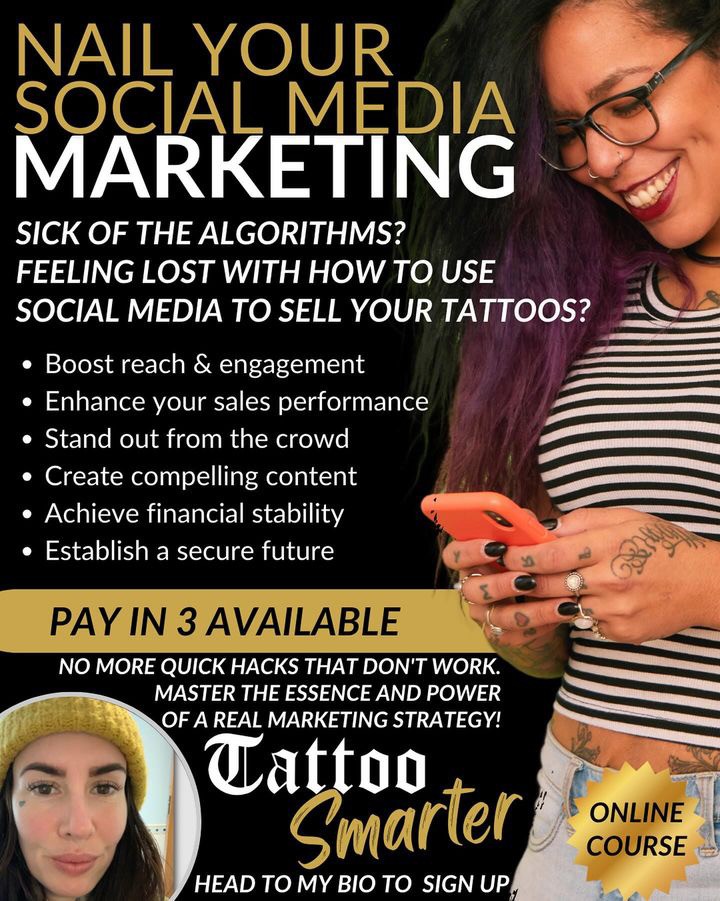
If you’re interested in learning more about Kezz and her services, you can visit her website here. Kezz has recently introduced a new course for tattoo artists on social media marketing here, along with a range of other advice and courses. She is also the founder of the Together Tattoo Network business events, which support women, queer, BIPOC, disabled artists, and other marginalised voices often overlooked in the tattooing industry. For details on their in-person event in October, visit their Instagram page @togethertattoonetwork
